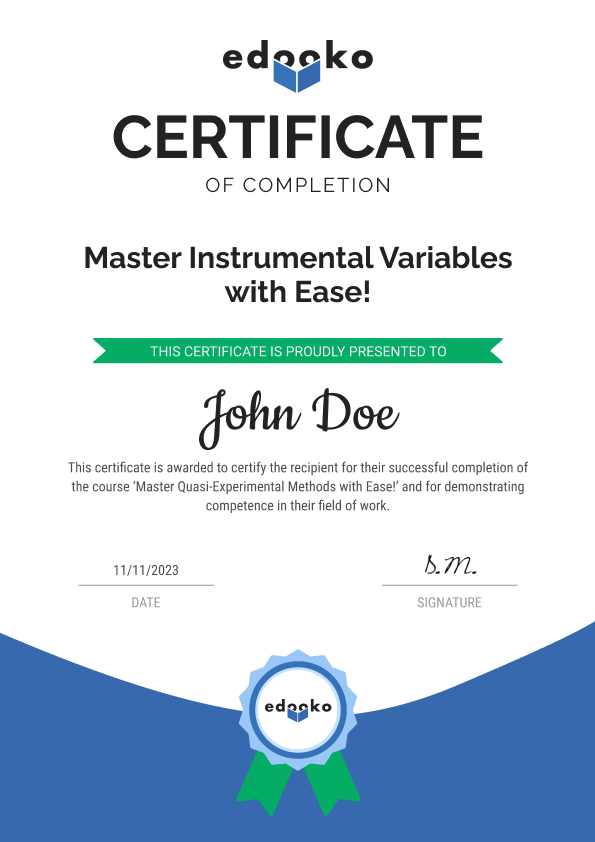Designed for researchers, analysts, and graduate students, this course demystifies instrumental variable techniques, making them accessible, intuitive, and applicable to real-world empirical challenges.
Avoid the inefficiencies of piecing together fragmented resources. Gain a solid conceptual and practical understanding in hours, not weeks.
Important: This course is a high-leverage investment. It could save you thousands in tuition, textbooks, tutoring costs, and research time.




Gain a solid understanding of instrumental variables and proxy methods without needing advanced math.
This course is designed for Master’s and PhD students who want to apply econometric techniques with confidence. Lessons are delivered in short, clear videos that make complex concepts easy to understand and use.
Module 1
Module 2
Module 3
Module 4
Module 5
Module 6
Module 7
Module 8
Module 9
Understand when Instrumental Variables work and when they do not.
Module 10
Module 11
Module 12
Take the principles we teach inside this program to enrich and provide depth to your research papers.
Do not let math anxiety hold you back! Our advanced courses are accessible to even those with a limited math background.
We leverage the expertise of education and pedagogy professionals to design courses that are easy to understand and remember.
Designed by a creative director and read by a professional narrator, our courses tell a visual story to engage learners and facilitate understanding.
1h 50m
12 Modules
Prof. dr. Deni Mazrekaj
Stata and R
Upon finishing a course on Instrumental Variables, you will be able to:

“I was skeptical about how much I would be able to learn in a course without a strong math background, but this course exceeded my expectations. The instructors’ clear explanations and intuitive approach made it easy to grasp the math concepts and apply them in my work. Thank you!”
– Mark Brown
At Edooko, we’re confident that if you commit to the course and apply what you learn, you’ll walk away with a top-tier understanding of the fundamentals of Instrumental Variables—even without a strong math background.
If you feel the course doesn’t deliver on that promise, simply email us at [email protected] within 5 days of purchase for a full refund. No hassle.
Most of our students say this course has completely changed how they approach Instrumental Variables—and for some, it’s been a game-changer in their academic journey.
Terms and conditions apply

This course was developed by an award winning professor, dr. Deni Mazrekaj, with the support of a dedicated team of researchers, educational specialists, and content creators.
Deni Mazrekaj is a professor of sociology at Utrecht University and an affiliated researcher at the University of Oxford. He holds a Ph.D. in Economics from KU Leuven. Deni has taught Advanced Quantitative Methods at the University of Oxford and is currently the coordinator of the Methods and Statistics course at Utrecht University. In his spare time, he is an associate editor of the interdisciplinary Nature journal Humanities & Social Sciences Communications. Deni has received several awards from the American Sociological Association, and the European Academy of Sociology for his research in sociology.
As a data scientist, I struggled to understand quasi-experimental methods and how to apply them. This course not only provided a clear and concise overview of the concepts but also allowed me to practice using them in various scenarios. I feel much more prepared and confident in my abilities now.
I was intimidated by the math-heavy courses on quasi-experimental methods, but the “Instrumental Variables” course was exactly what I needed. The intuitive approach made it easy to understand and now I feel confident in my ability to apply these techniques in my research.
I was skeptical about how much I would be able to learn in a course without a strong math background, but this course exceeded my expectations. The instructors’ clear explanations and intuitive approach made it easy to grasp the math concepts and apply them in my work. Thank you!
I didn’t expect a course on Instrumental Variables to be so engaging! The clear examples, real-life applications, and well-structured lessons kept me motivated throughout. I’m now using the techniques I learned in my own research with great success.
The mix of theoretical insights and hands-on practice in this course was exactly what I needed. It’s one thing to understand the theory, but being able to apply it in real-world scenarios using Stata was invaluable. I highly recommend this course for anyone looking to deepen their knowledge of causal inference.
I have taken several statistics courses before, but none have explained the concept of Instrumental Variables as clearly as this one. The instructor’s approach to simplifying complex ideas without compromising depth is exceptional. I now feel more confident in my data analysis skills.
Edooko courses are suitable for researchers, PhD candidates, data scientists, and anyone with a solid grasp of statistics who is seeking to enhance their understanding of quantitative methods. Our courses are not beginner-friendly.
To get the most out of our courses, we recommend that students have a solid grasp of undergraduate level statistics and mathematics. This includes a basic understanding of concepts such as probability, sampling, hypothesis testing, and regression analysis.
The assignments we give may include quizzes, problem sets, written assignments, and projects. The specific assignments will depend on the course and may vary from one module to the next.
Yes, you can enroll at any time and learn at your own pace.
At the moment we offer PayPal, Visa, Mastercard, Discover, American Express and UnionPay.
Edooko is committed to making our courses accessible to as many students as possible. To that end, we offer discounts to students with disadvantaged backgrounds and students from low-income countries. If you fall into one of these categories and are interested in taking one of our courses, please reach out to us. We are here to help you succeed.